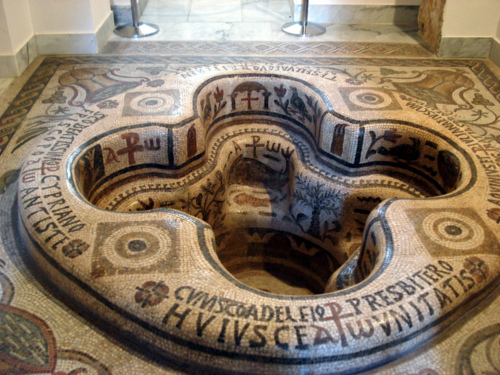Feast of the Most Holy Trinity
Lectionary #165
Deut 4:32-34, 39-40
Psalm 33:4-5, 6, 9, 18-19, 20, 22 (12b)
Romans 8:14-17
Matthew 28:16-20
“Go, therefore, and make disciples of all nations, baptizing them in the name of the Father, and of the Son, and of the Holy Spirit, teaching them to observe all that I have commanded you.”
There were no baptisms celebrated at this year’s Easter Vigil Mass at my parish. I found that to be disappointing on two levels. I missed the Baptismal Rite itself, which I find to be one of the most moving parts of the Easter Vigil liturgy. But I was also disappointed because the lack of catechumens is a sign that the church is not healthy or growing. We are not doing very well in terms of fulfilling the mandate to make disciples of all nations.
How do we draw people to the faith? How do we “make disciples”? This week’s readings do not offer many clues or suggestions so much as a directive. Matthew’s Gospel tells us that we must try to share what Jesus taught and commanded us to do. Sounds clear enough, but we might ask the further question – what is the best way to share that teaching?
I am a theologian. I have spent many years now trying to teach people about Catholicism, and in more recent years as a department chairperson I have spent a good deal of time watching other people try their best to teach students about Catholicism. One thing that I have learned is that the best teachers establish a strong rapport with their students. Great teachers interact with their students as human beings. They talk with them before and after class. They know their students’ names. They take the time to find out who they are, and what is important to them, and what they do when they’re not being students. That connection changes the dynamics of the classroom and the interaction a teacher has with her students. It enhances learning.
Pope Francis has become known as an evangelist – as someone who is actively working to make new disciples. He models the importance of relationship for teaching and evangelization. He is out in the world, and he is not there primarily to deliver a message, but to encounter people – to establish a relationship. The message he brings is not new; indeed it is as old as the Gospel itself: discover the presence of God in the world and in your heart, love the poor, show mercy, devote yourself to Jesus Christ. But it is somehow easier to hear the message and to recognize its profundity when it comes from a man who is living it out in a spirit of such love. Let us pray that Francis may find great success in his efforts at evangelization. May he help all of us who already call ourselves disciples to be drawn to a deeper conversion, and may he draw new disciples to Christ.




